SEO for Voice Search
Voice search is exploding in popularity, and this trend presents an opportunity for those with a calculated online presence. Understanding how search engines generate their rankings will help you get your content higher on SERPs and drive business results. From mobile devices using Siri to Amazon’s Alexa, more people search hands-free than ever before. The voice search optimization tips we will cover in this guide are
- Understanding your audience
- Keep content readable
- Make information accessible
- Use voice search specific keywords
- Take advantage of Structured Data Markup Helper
Voice Search Has Exploded in Popularity
The convenience of voice search is obvious, and this hands-free inquiry method has taken off in recent years. A third of the US population uses voice search features. This is projected to increase by nearly 10% in the next year. Online marketing groups are publishing headlines about the “voice search revolution”. E-commerce groups have seen this coming for a while, and the technology and environmental trends are reaching a critical mass in 2021.
With this increase in popularity comes the new potential for SEO strategy. Optimizing content for voice search has key similarities and differences to more traditional input methods. By following the advice below, you can position your business to take advantage of this growth.
Tips for Voice Search Optimization
1) Understand Audience
In any content generation process, understanding your audience is vital to achieving your goals. Voice search users may be different from the audience you have experience targeting. This audience is significantly younger, with millennials 4x more likely than baby boomers to use the feature. They use the desktop less and their phones more.
The most common searches may seem less than helpful for most business opportunities. These include questions about the weather, fun questions, and the news.
Despite this, there is huge potential here, particularly for local businesses. 58% of individuals report finding a local business with voice search. 46% say they will search daily at a local level for small businesses. You need to make sure your company has the best chance at being a search result for these voice search queries.
In implementing your SEO plan, remember your audience. It is local, mobile, and younger. This information can help you craft messages to target these populations better.
For example, it can be fantastic in the generation of targeted long-tail keywords. Millennials read more reviews, listen to friends, and are extremely cost-mindful. They tend to be more environmentally conscious and are more likely to value experiences over things. Include information that satisfies these topics, specific to your industry and business. Some examples of searches close to the author’s heart, that demonstrates these ideas:
- Best pizza for on the Wisconsin Campus
- Are Liverpool kits produced sustainably?
- Best delivery app in Madison, Wisconsin
- Best free productivity software with time tracking
- Why do all of my sports teams lose?
That last one may not be as representative as the others. With these, you ensure your content answers the questions asked. Your pizza restaurant should be easily able to be identified in Madison, for example.
Millennials require different marketing tactics than other generations. Below is a quick guide on some marketing tactics for this younger demographic. Use this information in tandem with your broader SEO and voice optimization plan.
Think about how you can implement these strategies into the content you produce. Keep this and the audience in mind as you read the rest of this guide.
2) Keep Content Readable for Users and Google
If you have SEO experience, this will likely not come as a surprise. Voice queries need easily readable content even more than traditional methods. Make the content you produce readable, succinct, and clear. This will benefit your audience, but the bigger target here is the search engines themselves.
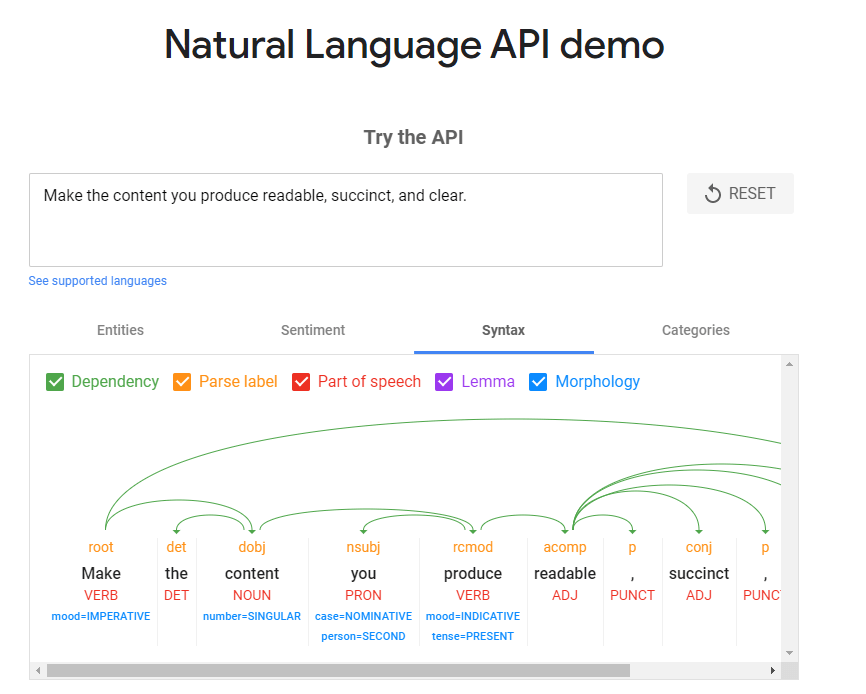
Google is has become better and better at natural language processing (NLP). This post by SEO experts at Yoast provides many more insights on how NLP works in practice. Some common mistakes are:
- Massive paragraphs
- Overly complicated sentences
- No transitions
- Passive voice
- Bad headings
In summary, all the things that hurt readability will hurt your SEO for voice search results. The search engine algorithms and natural language processing read your work just like a person does. You can test your work here.
For you, this means making your content more accessible to both people and search engines. At TrustRadius, we use the Hemmingway Editor. This will mark sections of passive voice and identify readability issues.
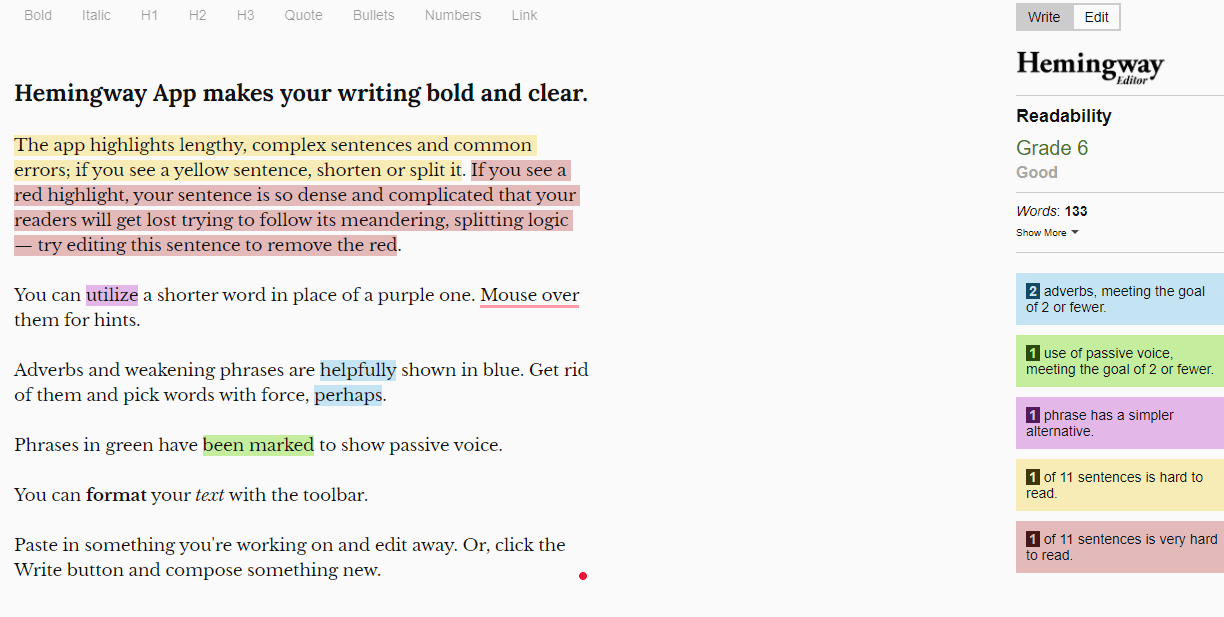
Try to remove any “very hard to read” sentences, and minimize hard-to-read ones. Use this tool for the featured snippet as well as the content itself. Better natural language will help the search engine find your brand, and read your content to the searcher.
3) Keep Information Extremely Accessible
Contact info, address, and office hours are some of the most common search queries. Make sure this information is easily found by both the reader and the search engine. Avoid burying this information deep in long paragraphs. Consider using a combination of images and text that convey the important data. Finally, label crucial information with keywords that describe what it is.
An example of some best practices would include:
- A clearly labeled “Business Hours” section, with times and days
- An accompanying Image to support this
- Business address in a standard format for navigation software
- Phone numbers, with area codes, grouped with other contact info
Some bad examples to avoid are:
- Discussing business hours in lengthy text boxes
- No images, or only images
- Address conveyed in terms relative like “turn left at the McDonalds”
- Non-standard formats for contact info and addresses
- Email and phone separated or hard to find
4) Use Voice-Search Specific Language
Voice searchers tend to use different language than those who type their queries. Use this to your advantage when thinking of your SEO strategy. The differences in search type are somewhat predictable. People tend to ask voice assistants questions. The rise of smart speakers like Alexa and Google Home means this is done constantly in a user’s home environment. Mobile devices allow the same when in the car. Just as importantly, these questions include modifiers such as the phrase “near me.”
The trend towards “near me” searches gives a fantastic opportunity for local businesses to take advantage of voice search. The first step to leveraging this is making sure search engines can find you. Update your Google business profile. This keeps some of that most basic information, like contact and address, accurate.
Since users are asking questions, make sure your content reflects this. Using long-tail keywords like “where is my business located?” and “how much do Danny’s Apples cost?” as subheadings, and then answer them. Another way to include this is with an FAQ page or section, which many search engines love. Your customers will also appreciate the accessibility of this information.
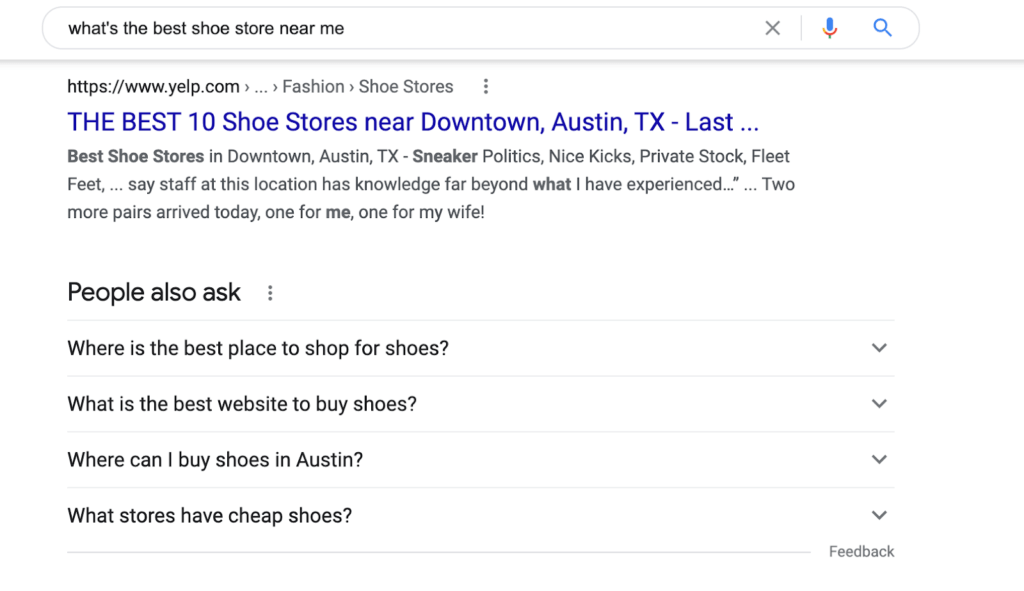
If you are not sure which questions to include, then pretend to be one of your customers. The People Also Ask feature on Google is a fantastic way of discovering what people want to know about your brand.
5) Take Advantage of Structured Data Markup Helper
Many of the tips here revolve around making information more accessible, and Structured Data Markup is a fantastic way of hammering this home. Structured data is a method used by search engines to categorize information into types to make them more useable. This will help Google recognize the information in your content for what it is. It translates to better rankings for you, and easier accessibility for your business.
If your content includes “(555) 555-5555”, then ideally the structured data classifies this as a phone number. This is done to benefit the search engine, resulting in them being able to easily lookup and this information and provide it to the user. There is code you can place in your website construction to help the engine do this more effectively. One organization that provides this is Schema.org, which uses their schema markup that highlights microdata in these classifications.
Structured Data Markup Helper from Google is a way of turning this codification into a reality for your business. The tool will let you manually select information types, and then convert the classification directly into the correct form of HTML for your website. We will demonstrate this using our piece on the Best Customer Relationship Management Software for Small Businesses.
When you open this page, start by choosing the type of content you are working on. Then, paste the URL into the box.
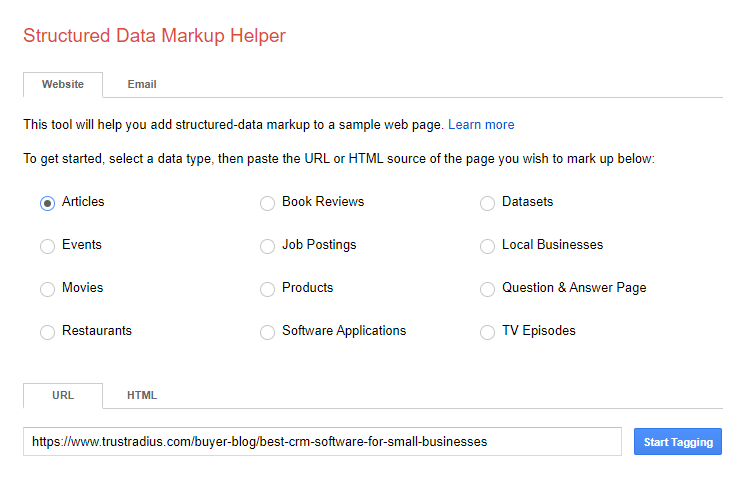
From here, the process is simple. Highlight the individual sections of your work, and right-click. Select the type of data you want the information to be classified as. This works for images, headers, and text.
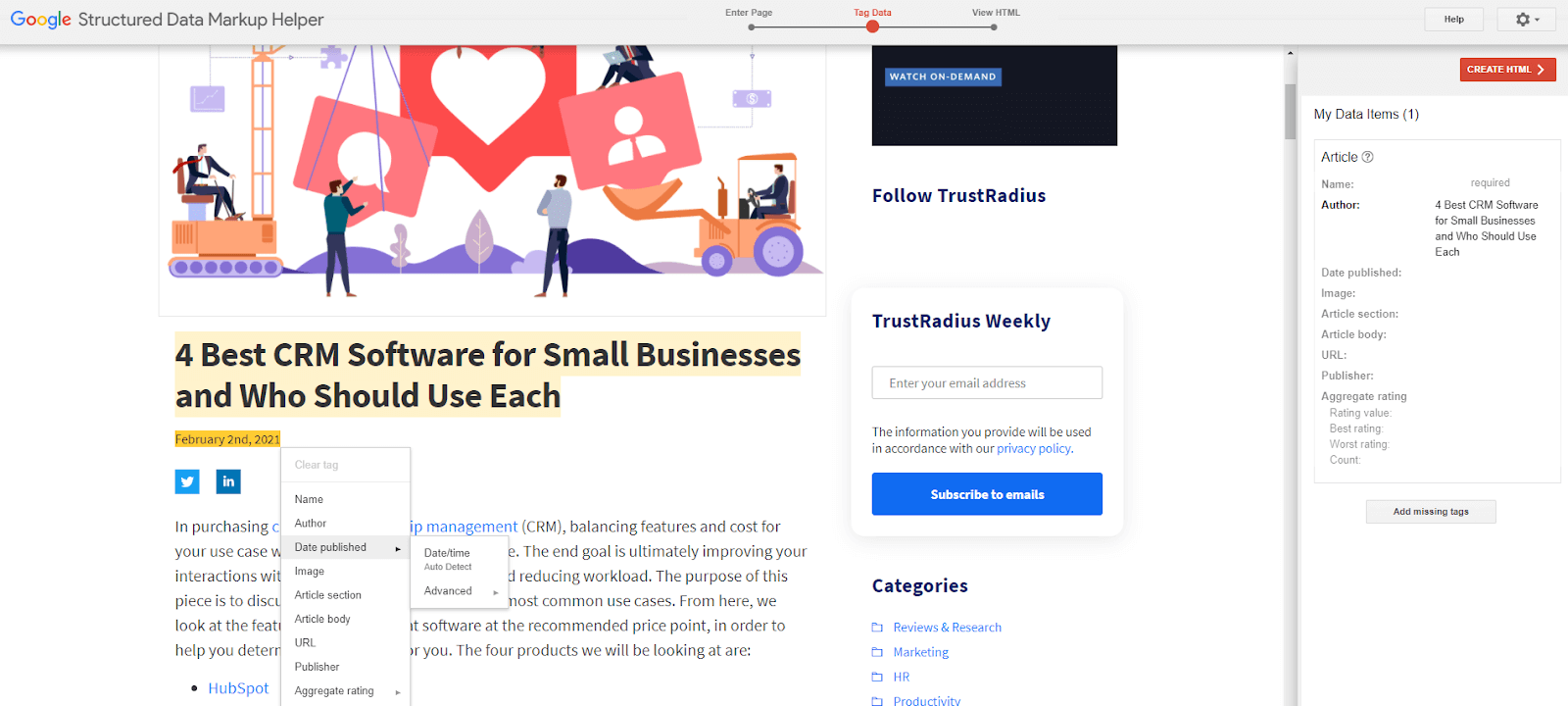
Go through this process for the entire document. Once you are done, simply click “create HTML” in the top-right corner.
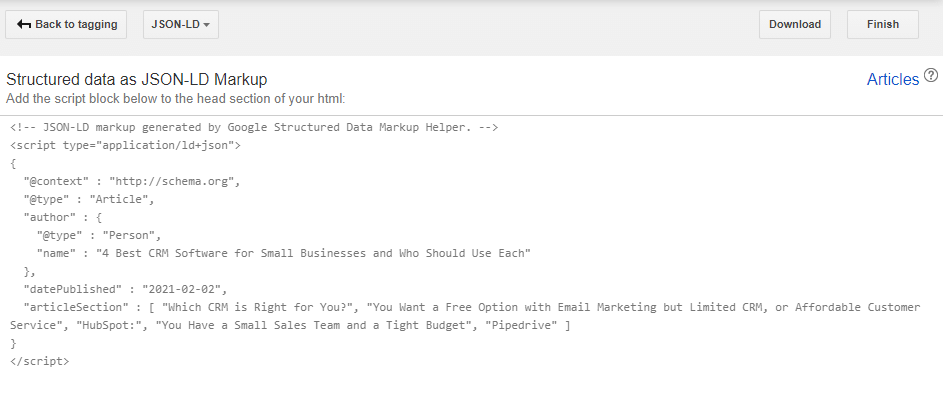
This can be saved, or simply copied and pasted. As it says, paste this information into the head section of your HTML. This can be done on common Content Management Systems like WordPress.
This process is an easy way of highlighting those crucial sections that were highlighted earlier. This is especially good for highlighting subheadings with those long-tail keywords specific to your industry.
The Future of Voice Search SEO
Using this guide will help you identify and address problem areas in your voice SEO strategy.
AI, Voice Search, and Mobile-friendliness are among the biggest SEO trends of 2021. As search engines and voice search technology continue to improve, so will the strategies on how to use them. For your company, staying on top of this search method can mean big business opportunities. If you are interested in the future of SEO, check out the Finances Online post discussing predictions for 2021/22.
Was this helpful?
